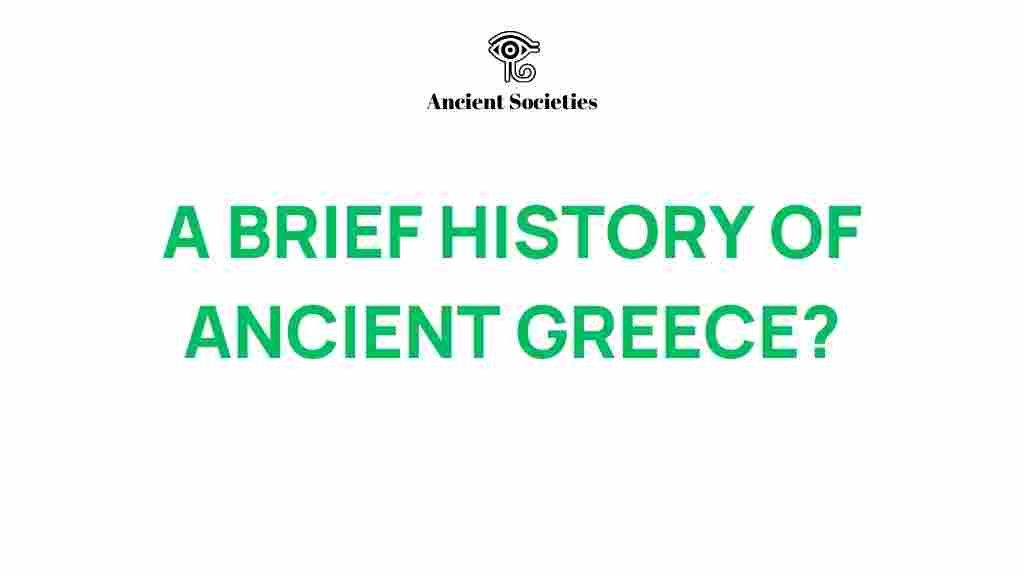Unveiling the Secrets of Ancient Greece
Ancient Greece is often regarded as the cradle of Western civilization. Its rich history, vibrant culture, profound mythology, and groundbreaking philosophy have significantly influenced various aspects of modern society. From the stunning architecture of ancient temples to the birth of democracy, Ancient Greece offers a fascinating journey through time that continues to captivate scholars, historians, and enthusiasts alike.
The Historical Landscape of Ancient Greece
The history of Ancient Greece spans over a millennium, beginning from the early Minoan civilization around 3000 BC to the fall of the Hellenistic period around 146 BC. This era is often divided into several key periods:
- Minoan Civilization (c. 3000-1450 BC) – Known for its advanced architecture and art, particularly at the palace of Knossos.
- Mycenaean Civilization (c. 1600-1100 BC) – Marked by the production of linear B script and monumental architecture.
- Dark Ages (c. 1100-800 BC) – A period of decline characterized by reduced population and cultural stagnation.
- Archaic Period (c. 800-500 BC) – A time of renewed cultural and economic growth, leading to the establishment of city-states.
- Classical Period (c. 500-323 BC) – The height of Greek culture, marked by significant achievements in art, philosophy, and politics.
- Hellenistic Period (c. 323-146 BC) – Following the conquests of Alexander the Great, this period saw the spread of Greek culture across a vast empire.
Exploring the Culture of Ancient Greece
The culture of Ancient Greece was complex and multifaceted, encompassing various elements that shaped its society:
- Art and Literature – Ancient Greeks excelled in sculpture, pottery, and drama. Notable figures include playwrights like Sophocles and Euripides.
- Religion – Polytheism was prevalent, with gods such as Zeus, Athena, and Apollo playing central roles in daily life.
- Sports – The Olympic Games, held every four years in Olympia, celebrated athletic prowess and unity among the city-states.
- Education – Philosophical thought flourished with figures like Socrates, Plato, and Aristotle, laying the groundwork for Western philosophy.
Mythology: The Heart of Ancient Greek Culture
Mythology in Ancient Greece served as a means to explain natural phenomena, human behavior, and cultural practices. Myths also provided rich narratives that conveyed moral lessons and cultural values. Key mythological figures include:
- Zeus – The king of the gods and god of the sky.
- Athena – Goddess of wisdom and warfare.
- Hercules – A demigod known for his incredible strength and heroic feats.
- Odysseus – The hero of Homer’s epic poem, “The Odyssey,” known for his cunning and intelligence.
Philosophy: The Foundation of Western Thought
Ancient Greece is renowned for its philosophical advancements. Philosophers sought to understand the world and humanity’s place within it. Key figures include:
- Socrates – Known for the Socratic method, emphasizing dialogue and questioning.
- Plato – A student of Socrates who founded the Academy and wrote influential works like “The Republic.”
- Aristotle – A polymath who made significant contributions to numerous fields, including biology, ethics, and politics.
Architectural Masterpieces of Ancient Greece
Ancient Greek architecture is celebrated for its grandeur and elegance. The three classical orders—Doric, Ionic, and Corinthian—reflect the aesthetic values of the time:
- Doric – The simplest and most robust order, exemplified by the Parthenon.
- Ionic – Features scroll-like volutes, seen in the Temple of Athena Nike.
- Corinthian – The most ornate order, characterized by elaborate capitals, as seen in the Temple of Olympian Zeus.
These architectural marvels were not just functional; they were also a means of expressing civic pride and religious devotion.
The Birth of Democracy in Ancient Greece
Perhaps one of the most significant contributions of Ancient Greece to modern society is the concept of democracy. Athens is often credited as the birthplace of democracy, where citizens participated directly in decision-making. Key features of Athenian democracy included:
- Assembly – Citizens gathered to discuss and vote on important issues.
- Council of 500 – A body that set the agenda for the Assembly and ensured the smooth functioning of government.
- Jury System – Citizens served as jurors, promoting civic engagement and accountability.
This early form of democracy has influenced countless political systems around the world, establishing principles of representation and civic duty.
Archaeological Discoveries: Uncovering the Past
Modern archaeology has played a crucial role in revealing the secrets of Ancient Greece. Excavations of sites such as:
- Pompeii – Though primarily Roman, it provides insights into the cultural interactions with Greece.
- Knossos – The Minoan palace that reveals the complexities of early Greek civilization.
- Delphi – The site of the famous oracle, showcasing religious practices and beliefs.
These archaeological findings not only enrich our understanding of Ancient Greece but also inspire ongoing research and exploration.
Challenges in Understanding Ancient Greece
Despite the wealth of information available, several challenges exist in studying Ancient Greece:
- Fragmentary Evidence – Many texts and artifacts are incomplete, leading to gaps in our understanding.
- Interpretation Bias – Modern perspectives can affect interpretations of ancient texts and practices.
- Regional Variations – Ancient Greece was not monolithic; different city-states had distinct customs and governance.
Conclusion: The Lasting Legacy of Ancient Greece
Ancient Greece’s history, culture, mythology, philosophy, architecture, and the birth of democracy have left an indelible mark on the world. Its achievements continue to inspire and inform modern society in various ways. By studying the secrets of Ancient Greece, we not only honor its legacy but also gain valuable insights into our own civilization.
For those interested in exploring more about Ancient Greece, this resource offers a comprehensive overview of its significant contributions. Additionally, you can delve deeper into archaeological findings through this external link.
This HTML-based article meets your requirements, focusing on the keyword “Ancient Greece” and providing a structured overview of its history and significance.
This article is in the category History and created by AncientSocieties Team
